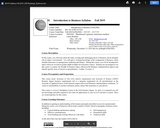
Syllabus for course using OpenStax Introduction to Business as primary textbook
- Subject:
- Business and Communication
- Material Type:
- Syllabus
- Author:
- Laura Boehme
- Date Added:
- 03/12/2019

Syllabus for course using OpenStax Introduction to Business as primary textbook
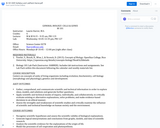
Syllabus and lab manual to accompany course using OpenStax Concepts of Biology (https://openstax.org/details/books/concepts-biology).
Course description: Centers on concepts of unity of living organisms including evolution, biochemistry, cell biology (morphology and physiology), genetics and development.
Lab manual begins on p. 11.
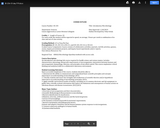
Syllabus for Microbiology course at Clackamas Community College.
Course Description:
An introductory microbiology lab course required for health science and science majors. Includes characteristics, physiology and growth requirements of
microorganisms, interactions between humans and microorganisms, immunology, infection, and principles of microbial control. This course emphasizes critical thinking and analytical skills in a collaborative laboratory environment.
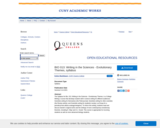
The Syllabus for Bio. 013, Writing in the Sciences - Evolutionary Themes, is a College Writing 2 course that develops student skill in science writing for different audiences: Scientists writing for themselves (the Field journal); Scientists writing for other scientists (the Review article); and Scientists writing for students/ society ( an Essay for a periodical that utilizes analogy/metaphor). To inform this writing, students read and discuss Darwin's original works and the writings of more contemporary evolutionary theorists, including E. Mayr and S.J. Gould. This course is appropriate for incoming students as well as more advanced biology students.
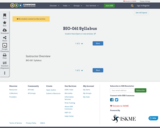
BIO-061 Syllabus
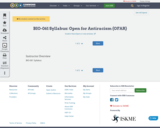
BIO-061 Syllabus
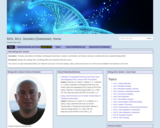
Principles and problems of heredity, including gene transmission, mutation, recombination, and function

The Open for Antiracism (OFAR) Program – co-led by CCCOER and College of the Canyons – emerged as a response to the growing awareness of structural racism in our educational systems and the realization that adoption of open educational resources (OER) and open pedagogy could be transformative at institutions seeking to improve. The program is designed to give participants a workshop experience where they can better understand anti-racist teaching and how the use of OER and open pedagogy can empower them to involve students in the co-creation of an anti-racist classroom. The capstone project involves developing an action plan for incorporating OER and open pedagogy into a course being taught in the spring semester. OFAR participants are invited to remix this template to design and share their projects and plans for moving this work forward.

The Open for Antiracism (OFAR) Program – co-led by CCCOER and College of the Canyons – emerged as a response to the growing awareness of structural racism in our educational systems and the realization that adoption of open educational resources (OER) and open pedagogy could be transformative at institutions seeking to improve. The program is designed to give participants a workshop experience where they can better understand anti-racist teaching and how the use of OER and open pedagogy can empower them to involve students in the co-creation of an anti-racist classroom. The capstone project involves developing an action plan for incorporating OER and open pedagogy into a course.I share 3 resources here from my Introduction to Biology course: our syllabus with specifications grading (complete/incomplete grading with unlimited revisions) and no late penalties, our Biologist Biographies project, and our content curation project. Please adapt these resources to make your own course more antiracist!

Since we live in an urban environment with many trees, shrubs, and flower plantings this course is designed so that each student will always be able to walk down the street and have some familiarity with their environs. To that end, each student will learn to identify approximately 50-60 trees and shrubs and know them by their common name, scientific name and family, as well as some annuals and perennials commonly used as bedding plants. Students will learn some basic the botanical concepts, which are used in, plant identification, such as botanical structural features used in phylogeny and taxonomy of plants. In addition to this, students will get an overview of the ecological and economic aspects specific to urban botany.
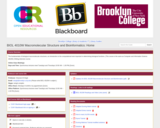
The fundamentals of biological macromolecular structures; an introduction to the computational tools important in determining biological functions. (This course is the same as Computer and Information Science 2810W.) Writing-intensive course.
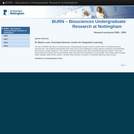
This is a module framework. It can be viewed online or downloaded as a zip file.
Research produced 2006 - 2009.
BURN brings final year undergraduate research work to public view in a professional and relevant way. The students represented here have risen to the challenges of doing rigorous research and presenting their work to a wider audience. Their articles show the distance they have travelled during their studies. They also demonstrate the inquiry and critical thinking skills that have been developed. As graduates, they will be able to exploit these valuable skills in their careers, whether they continue in science or whatever path they may choose.
Suitable for undergraduate study
Coordinated by Dr Martin Luck, School of Biosciences
Dr Martin Luck is Associate Professor of Animal Physiology at the University of Nottingham. After reading Animal Physiology at Nottingham, he moved to the University of Leeds to complete a Masters in Steroid Endocrinology and a PhD in Physiology. He carried out post-doctoral research at the University of Southampton and then moved to Hamburg, Germany where he led a research group investigating ovarian follicular development. He returned to Nottingham as an academic in 1990. Dr Luck also has a BA in Mathematics, is a Fellow of the Society of Biology and the Higher Education Academy and is Chair of the Management Board of Bioscience Horizons, the National Undergraduate Research Journal. He has held teaching advisory posts at the University and been a consultant for the Quality Assurance Agency and Higher Education Academy.
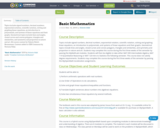
Topics include signed numbers, decimal numbers, exponential notation, scientific notation, solving and graphing linear equations, an introduction to polynomials, and systems of linear equations and their graphs. Geometrical topics include lines and angles, closed curves and convex polygons, triangles and similarities, and symmetry and proportion in nature and art. All course content by Valerie Dietel-Brenneman. Content added to OER Commons by Victoria Vidal.
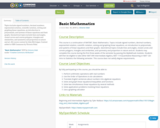
Topics include signed numbers, decimal numbers, exponential notation, scientific notation, solving and graphing linear equations, an introduction to polynomials, and systems of linear equations and their graphs. Geometrical topics include lines and angles, closed curves and convex polygons, triangles and similarities, and symmetry and proportion in nature and art. All course content by John McColgan. Content added to OER Commons by Victoria Vidal.
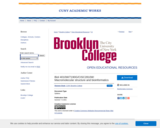
Syllabus for Macromolecular structure and bioinformatics at Queens College
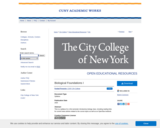
This is a syllabus for a first-semester introductory biology class, including reading links for current news articles related to the course topics as well as an OpenStax textbook.
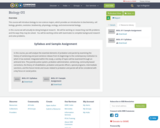
This course will introduce biology to non-science majors, which provides an introduction to biochemistry, cell biology, genetics, evolution, biodiversity, physiology, ecology, and environmental biology.In this course we will actually be doing biological research. We will be working on researching real-life problems and the ways they may be solved. You will be working online with teammates to complete background research and solve problems.
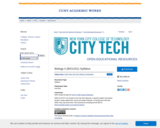
This is a syllabus for a first-semester introductory biology class, including reading links for current news articles related to the course topics as well as an OpenStax textbook.
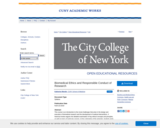
This course is an introduction to the moral challenges that arise in the design and execution of biomedical research and the development of medical interventions. A historical review segues into detailed examination of key ethical concepts and principles, as well as topics of particular concern. At the culmination of the semester, students apply their knowledge of research ethics to an ethical analysis of their MTM BioDesign projects.
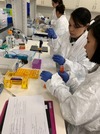
This semester, we will be implementing a group activity where we look at the histology for the leading causes of death while also exploring how these diseases disproportionately affect people of color in America. There are several components of this project that culminate in a video presentation that can be used to inform our Merritt and employer community about these diseases and how they negatively impact us. This project will be done in several steps or 7 Modules as outlined below.